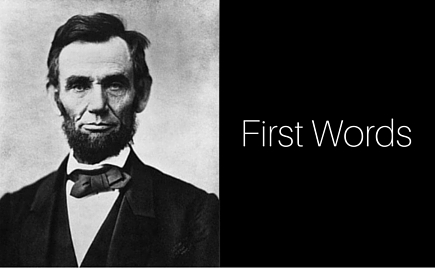First Words: Abraham Lincoln, March 4, 1861

Abraham Lincoln’s First Inaugural was preceded by the secession of seven southern states—and followed by the four more leaving the Union—not exactly a vote of confidence for the inexperienced sixteenth chief executive.
Lincoln came to office having masterfully maneuvered to with the Republican party nomination over far more experienced candidates. With the Democrats split between northern and southern factions over the issue of slavery, he won the general election despite not even appearing on ballots in the South. Lincoln and his party favored the immediate stop of slavery westward, with an eye to building a society modeled on northern capitalism, free wage-labor, and the ultimate extinction of slavery. As a response to his election, South Carolina, Mississippi, Florida, Alabama, Georgia, Louisiana, and Texas seceded between December 1860 and February 1861.
When Lincoln took the oath of office, hostilities had not begun, and four states (Virginia, Arkansas, North Carolina, and Tennessee) had yet to secede.
Lincoln expressly addressed the South, promising not to interfere with slavery where it already existed and arguing that secession was not constitutionally possible—and was in fact undemocratic. Finally, he asserted that the logic of secession made any new confederacy of states practically impossible, urged the South to reconsider, and asserted that any Civil War would be the South’s fault.
It was a brilliant speech, but not enough to turn the country away from war.
I have no purpose, directly or indirectly, to interfere with the institution of slavery in the States where it exists. I believe I have no lawful right to do so, and I have no inclination to do so.
. . .
I hold that, in contemplation of universal law and of the Constitution, the Union of these States is perpetual. Perpetuity is implied, if not expressed, in the fundamental law of all national governments. It is safe to assert that no government proper ever had a provision in its organic law for its own termination. Continue to execute all the express provisions of our National Constitution, and the Union will endure forever—it being impossible to destroy it except by some action not provided for in the instrument itself.
. . .
I therefore consider that, in view of the Constitution and the laws, the Union is unbroken; and to the extent of my ability I shall take care, as the Constitution itself expressly enjoins upon me, that the laws of the Union be faithfully executed in all the States. Doing this I deem to be only a simple duty on my part.
. . .
All profess to be content in the Union if all constitutional rights can be maintained. Is it true, then, that any right, plainly written in the Constitution, has been denied? I think not. Happily the human mind is so constituted that no party can reach to the audacity of doing this. Think, if you can, of a single instance in which a plainly written provision of the Constitution has ever been denied. If by the mere force of numbers a majority should deprive a minority of any clearly written constitutional right, it might, in a moral point of view, justify revolution—certainly would if such a right were a vital one. But such is not our case.
. . .
If a minority in such case will secede rather than acquiesce, they make a precedent which in turn will divide and ruin them; for a minority of their own will secede from them whenever a majority refuses to be controlled by such minority. For instance, why may not any portion of a new confederacy a year or two hence arbitrarily secede again, precisely as portions of the present Union now claim to secede from it? All who cherish disunion sentiments are now being educated to the exact temper of doing this.
Is there such perfect identity of interests among the States to compose a new Union, as to produce harmony only, and prevent renewed secession?
Plainly, the central idea of secession is the essence of anarchy. A majority held in restraint by constitutional checks and limitations, and always changing easily with deliberate changes of popular opinions and sentiments, is the only true sovereign of a free people. Whoever rejects it does, of necessity, fly to anarchy or to despotism. Unanimity is impossible; the rule of a minority, as a permanent arrangement, is wholly inadmissible; so that, rejecting the majority principle, anarchy or despotism in some form is all that is left.
. . .
One section of our country believes slavery is right, and ought to be extended, while the other believes it is wrong, and ought not to be extended. This is the only substantial dispute.
. . .
In your hands, my dissatisfied fellow-countrymen, and not in mine, is the momentous issue of civil war. The government will not assail you. You can have no conflict without being yourselves the aggressors. You have no oath registered in heaven to destroy the government, while I shall have the most solemn one to "preserve, protect, and defend it."
I am loath to close. We are not enemies, but friends. We must not be enemies. Though passion may have strained, it must not break our bonds of affection. The mystic chords of memory, stretching from every battle-field and patriot grave to every living heart and hearthstone all over this broad land, will yet swell the chorus of the Union when again touched, as surely they will be, by the better angels of our nature.
Read Lincoln's entire first inaugural address.
Find out more about Abraham Lincoln.